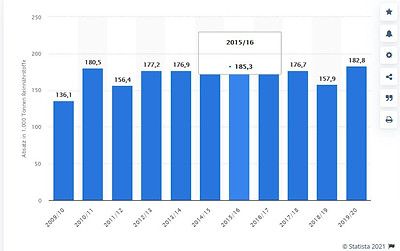Acerca de

Photo: Pixabay Royalty-free
FERTILIZER & PESTICIDES
The facts about poisons in agriculture
In beer and honey, on fruit and vegetables, in the grass on playgrounds and even in urine and in the air - traces of pesticides from agriculture can now be found everywhere. The realization that pesticides have a negative impact on human health is by no means new. It has also been known for years that they massively damage insects and plants and contaminate water bodies.
In Austria, the amount of pesticides used has decreased only minimally in recent decades. To date, there has obviously been a lack of political will to reduce the use of pesticides and their harmful effects on people and nature. Never before have so many fertilizers and pesticides been used as they are today!
T he reason for this is easy to explain: the oligopoly of the big chemical companies lobbies politicians to continuously expand the highly lucrative market for mineral fertilizers and pesticides. Environmental responsibility - none!
What does this mean for us and especially for our descendants? We must not wait for someone else to do it for us, we must take it into our own hands to stand up for nature. Personal responsibility is the need of the hour. Let's start right in front of your own front door.
Never before have so many fertilizers and pesticides been used as they are today!
No country in the world has an ambitious pesticide reduction strategy or even concepts for agriculture without the use of chemical toxins! And not without reason:
The market for mineral fertilizers & pesticides is a highly lucrative oligopoly. Only a few well-connected and influential agrochemical companies share it among themselves.
.At the forefront: German companies like Bayer and BASF.
According to media reports, the sale of pesticides in Austria doubled between 2011 and 2018. The Ministry of Agriculture, citing official secrecy and data protection, does not reveal how many pesticides Austria's farmers actually buy or use and how high the proportion of chemical and biological agents is.
The consequences of fertilizer and pesticide use for the environment are dramatic: insect deaths, dwindling plants, depleted soil and polluted water are just a few. Critics say you could easily do without a good half.
Austria was the only country to position itself AGAINST France's proposal to halve the use of pesticides across the EU by 2030.
In November 2021, the ÖVP, Greens and NEOS voted against an SPÖ motion that would have banned the use of glyphosate in Austria on November 19th. According to surveys, 93 percent of Austrians are against the use of the world's best-selling pesticide.
videos
Animated film - Frankfurter Allgemeine Zeitung
What exactly are pesticides?
ADR - Pesticide Atlas 2022 - Dangers of chemical pesticides
literature
Bayerischer Rundfunk - Our country
Pesticides endanger insects in water bodies.
The history of pesticides and their dangers!
QUARKS - repair days
Pesticides a danger to humans, animals and the environment?
ORF focus "MOTHER EARTH - pesticide drift - gone with the wind
photos

Fig.: Pesticide Atlas 2022
Heinrich Boll Foundation

Sales of fertilizers in Austria 2009-2020
In 1,000 tons of pure nutrients

Fig.: Pesticide Atlas 2022
Heinrich Boll Foundation
Podcast
Heinrich Böll Foundation - Pesticide Atlas
Pesticides & Agriculture 1/3
Land 30,000 tons of pesticides every year on German fields. The consequences for the environment are dramatic: dying insects, dwindling plants, depleted soil and polluted water are just a few. Critics say you could easily do without a good half.
Heinrich Böll Foundation - pesticide atlas
World of Double Standards (2/3)
Europe's corporations export almost undisturbed to the countries of the Global South. What is forbidden here because of the high level of danger can be used there under much worse conditions. The result: many millions of cases of poisoning every year. How can that be?
Heinrich Böll Foundation - Pesticide Atlas
The glyphosate case 3/3
In September 2022 it will be decided whether glyphosate, the total herbicide that can cause cancer, can continue to be used in the EU or whether it will be banned after years of bitter dispute. Why is glyphosate still on the market and why should it be banned?








